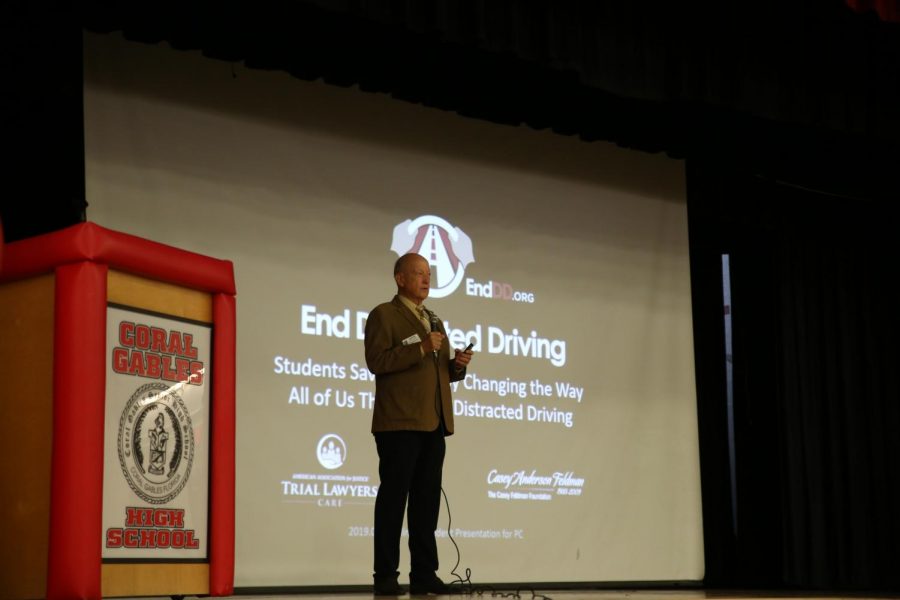Students Learn How to Stay Safe on the Road at the Distracted Driving Assembly
Speaker Wayne Parsons educated the students on the importance of staying focuses while driving.
Feb 10, 2019
On Tuesday, Feb. 5, all third-period classes were invited to attend an assembly in the auditorium about distracted driving and its detrimental effects on drivers and passengers. The event featured speakers Wayne Parsons, a trial lawyer, and Gabrielle D’Alemberte, a former Gables alumni. The speech was run by the “End Distracted Driving” movement and sponsored by the Casey Feldman Foundation. Both this foundation and the movement were started by Joel Feldman, whose daughter Casey passed away in a car accident when she was 21 as a result of distracted driving.
The presentation consisted of the speech and multiple videos to show students that this topic is not a joke. The presenters discussed the three different types of distraction (visual, cognitive and manual) and the harm they cause. Additional cognitive demands narrow a driver’s field of vision, making it hard for them to see all of their surroundings. Further, they talked about “sentence listening,” which takes the attention off of the road and into a conversation or other speech. While sentence listening, part of the brain does not function and does not allow for safe driving.
The videos in the assembly were both shocking and moving for the students because they portrayed the realities of what can happen when not paying attention, even if it is for just a few seconds. The speakers told the audience that 60% of teen car crashes result from distracted driving, and most distracted driving occurs among 19-39-year-olds. The speakers also displayed a video made by another school which showed a boy rushing to take away his brother’s phone from his view to protect him from the severe effects of distracted driving.
“The presentation had me thinking how important it is to stay concentrated and focused while driving because accidents caused by distractions can happen within seconds. I have experienced distracted driving with parents and other relatives. Usually, they check their phone for notifications or they mess around with the GPS or radio. The presentation deterred me from driving distracted because it is a selfish act that can potentially end your life or someone else’s,” freshman Alana Fernandez said.
Towards the end of the presentation, the speakers also gave the students several solutions to help prevent distracted driving in the first place. Planning periodic stops on a long drive can help keep you safe and even if it seems like a nuisance, the “do not disturb while driving” function will keep any temptations to use your phone while driving at bay. In the end, the student body learned that distracted driving is a selfish choice and that being educated about these effects can change the way the future thinks about distracted driving.











